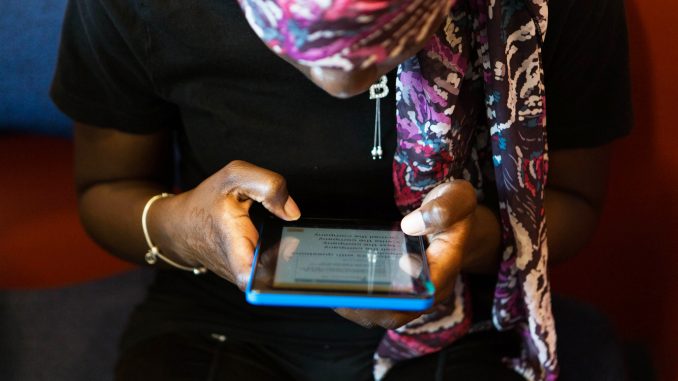
When she thinks about literacy education, Ulicia Lawrence-Oladeinde remembers a woman with a learning disability who came to the Pan-African Studies Community Education Program.
No one else would help with her education, but PASCEP helped her enroll in an adult diploma program, through which she eventually earned a GED.
Now, she’s in her second year of her master’s program.
“It makes such a difference if somebody just takes the time to listen and assess,” said Lawrence-Oladeinde, the director of PASCEP. “Adults don’t usually have a support system, so sometimes you have to build one. I wanted us to be a part of that support system.”
PASCEP is a low-cost, non-credit adult education program for Philadelphia residents based in the Entertainment and Community Education Center on Cecil B. Moore Avenue near 15th Street. Starting in August, PASCEP became one of various distribution location sites in the city where adult learners can sign up to use one of eight XPRIZE literacy apps.
The Adult Literacy XPRIZE, funded by The Barbara Bush Foundation for Family Literacy, is a worldwide competition that began in 2015 to have software developers create a smartphone or tablet application to increase literacy. Philadelphia is one of three cities, including Dallas and Los Angeles, participating in the organization’s distribution campaign.
The eight semifinalist apps created through the XPRIZE competition are designed for adult learners to develop their literacy skills.
PASCEP will test the apps with its users over the course of a year. Lawrence-Oladeinde hopes the app’s users will be able to take courses at PASCEP once they’ve reached a higher literacy level at the end of the test period.
As the apps are evaluated based on user experience and effectiveness, adult learners are randomly assigned to use one of the eight apps. After registering for the app, users receive a $25 gift card followed by larger compensation toward the end for participating in the project, Lawrence-Oladeinde said.
Five finalists will be selected halfway through the testing period.

Prior to adult learners officially using the apps, coordinators of the literacy app program determine interested users’ eligibility by assessing their literacy level.
The coordinators first check to see that the students have the technology to use the application. The app’s users are given a volunteer who individually works with them on the phone on one randomly assigned app for the remainder of the year.
“We figure out if they are roughly at or near a third-grade reading level,” said Anne Gemmell, director of family learning in the city’s Office of Adult Education. The office, which assesses Philadelphia participants’ eligibility, reached out to XPRIZE to have Philadelphia be a test site.
“We assess them to know how the apps are reaching the people who are struggling the most to read and need the most help,” Gemmell added.
Other distribution sites include the Lutheran Settlement House, United Way of Greater Philadelphia and Southern New Jersey and Project HOME’s technology center in North Philadelphia.
Gemmell said OAE tried to pinpoint areas where low literacy is common.
Gemmell was formerly the deputy of the Quality Pre-K Initiative under Mayor Jim Kenney and was also the campaign political director of Fight for Philly, a former coalition pushing for better schools, jobs and a more fair economy. She said her previous work with early education aligns with her current role in helping adult learners.
“We understand that parents are the first teachers,” Gemmell said. “The literacy and skills in the household are going to affect the children as they grow.”
Creators of the eight apps also designed each to suit the functional needs of adult learners struggling with literacy.
Lawrence-Oladeinde said that she noticed many adults with low literacy levels have creative minds.
Lyriko, an app created through the XPRIZE competition teaches adult learners to read through song lyrics.
“That just fascinates me because somebody knows, somebody understands that those people who have that creativity in their mindset, but have cognitive issues can learn this way,” Lawrence-Oladeinde said.
Since the literacy apps have been available to Philadelphia adult learners, users have been admiring the effectiveness of the programs.
“It makes things easier when you want to spell a word right, you can spell a word right,” said Gladys Stokes, a West Philadelphia resident who has been using the Lyriko app since August.
During a focus group meeting designed to help adult learners download and use the literacy apps, Gemmell said she met a “successful and incredibly intelligent man” who had been running his own business for decades.
“He wanted to learn to read better so he downloaded the Lyriko app and after he figured out how to download the app, his whole face lit up and was smiling ear to ear,” Gemmell said. “It was emotional for everybody watching him embark on this journey.”
Following the conclusion of the XPRIZE competition, OAE will continue to work closely with adults with low literacy levels.
“There will be a life beyond this XPRIZE partnership,” Gemmell said. “The apps are very helpful and we’re hoping they will be able to serve more people.


Be the first to comment